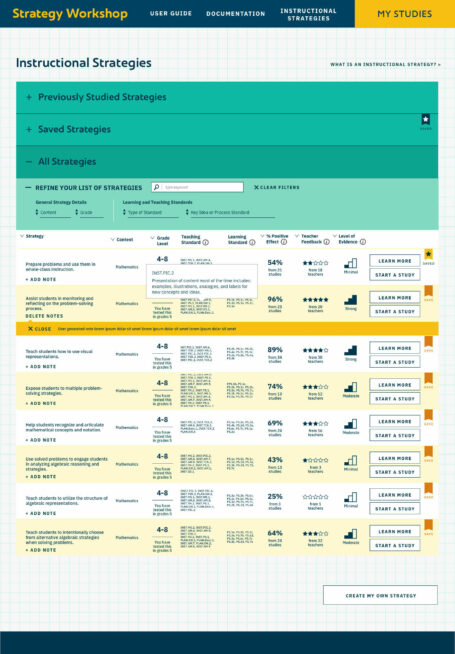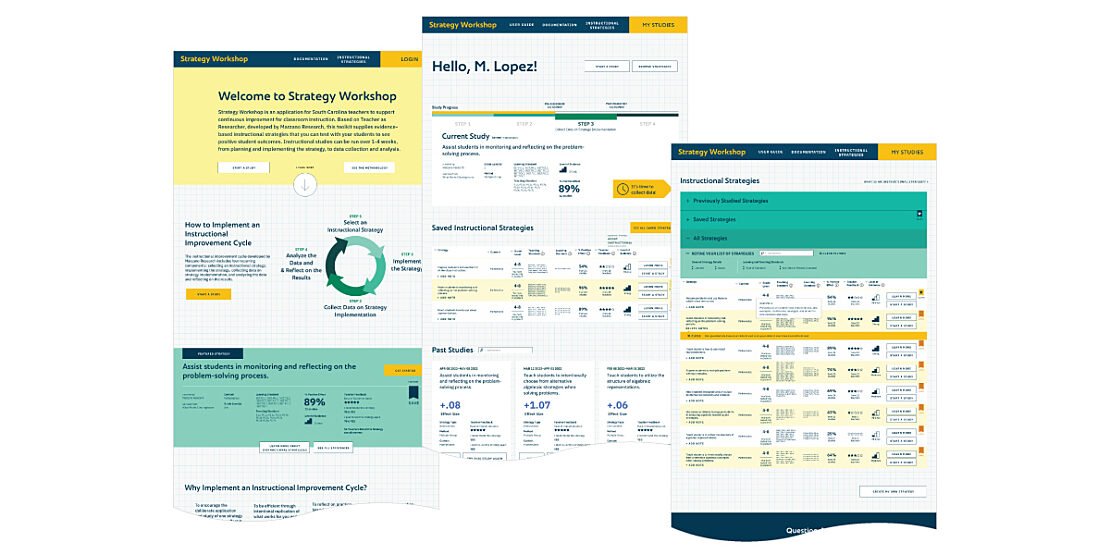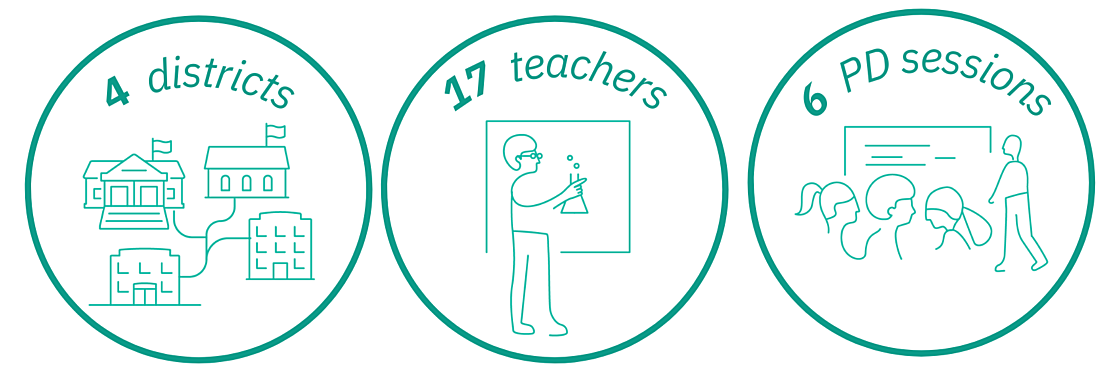At the onset of the pandemic, much of the initial focus in education addressed the academic impacts that students experienced within the classroom as well as students’ well-being during such a tumultuous time. As the pandemic has lingered, additional attention has turned to the impact of the pandemic on teacher well-being and retention. Teachers have been expected to not only deal with a worldwide health crisis, but also to ensure their students are learning under a variety of conditions, all of which has presented innumerable challenges for teachers and schools. One of EA’s partners, the South Carolina Department of Education (SCDE), has been focusing on new ways to help support teachers, increase their satisfaction with the profession, and improve retention. Like many states, the SCDE has seen double the number of mid-year vacancies in the state in 2022 compared to 2021. Given the possibility of teachers having their license suspended for mid-year resignation, this trend indicates a high level of dissatisfaction with the profession. The SCDE was concerned about teacher retention even prior to the pandemic, and now has decided to try something new.
To help address this issue, the SCDE has partnered with Marzano Research and Education Analytics (EA) to engage teachers in powerful professional learning through action research. Action research is a method in which teachers follow an inquiry process to examine and improve an educational practice using research they conduct within their classroom. Marzano Research’s Teacher as Researcher model supports teachers in undertaking a rigorous research process using a theoretical and methodological approach embedded in a toolkit to guide them through the inquiry process. A group of teachers in Alaska who had the opportunity to use the Teacher as Researcher model expressed their enthusiasm for the program, sharing that these experiences as teacher researchers were deeply relevant to—and had immediate impacts on—their classroom practice. By engaging in the research process within their classrooms, teachers can gain insight into whether their practices are effective, and in turn, they can see how their teaching is directly improving student learning.
As part of this work, EA is building a user-friendly, one-stop-shop software application for educators, called Strategy Workshop. The software application is being built and tested using the Marzano Research Teacher as Researcher model. The application will simplify and increase the efficiency with which teachers can execute critical steps of the model, including viewing and selecting evidence-based instructional strategies, testing the strategies, examining the results to determine their effectiveness, and sharing their experiences with other educators.
The goals of the SCDE in this work are to address teacher satisfaction by encouraging innovation in the classroom, while also enabling large-scale sharing of evidence-based instructional strategies. In turn, the department anticipates that teacher retention, teacher effectiveness, and student achievement will all improve.
Testing it out
This spring, our teams launched a pilot study in which 17 middle school math teachers across four school districts in South Carolina participated in a six-session professional development series led by Marzano Research, who guided teachers through using their Teacher as Researcher instructional improvement cycle toolkit. Teachers used the tools to engage in planning, analyzing, and reflecting on research that they conducted in their classrooms. As part of the pilot, teachers collaborated with one another to work through the planning and implementation process as they adapted their lessons to then incorporate the instructional strategies they wanted to try.
In partnership with Cricket Design Works, EA engaged in a user-centered design process to inform the build of a software application with teachers-as-users in mind. We observed and learned from the professional development (PD) sessions led by Marzano Research to inform the design of the software application, which aims to make it as easy as possible for teachers to use the Teacher as Researcher model, and to enable rapid scale up of the approach across the state. All of the work that teachers previously completed manually using Marzano Research's instructional improvement process, content, and tools will be built into the Strategy Workshop software application. The end goal of Strategy Workshop is to have a streamlined, user-friendly tool that allows teachers to try out their chosen instructional strategies without adding anything extraordinary to the already heavy workload that teachers experience.
Data from South Carolina’s Ed-Fi data warehouse will be pulled into the application so users can have access to real-time classroom data, including assessment scores and student demographics, which can help them contextualize results that they see in their classrooms. The platform will also contain a database, or “clearinghouse,” of evidence-based instructional strategies. Each strategy has a level of evidence from What Works Clearinghouse (minimal, moderate, or strong) associated with it, based on the strategy’s demonstrated effectiveness in practice. As teachers continue to use strategies, they can also provide feedback on their experience with using the strategy in their classroom. Teachers will be able to search and filter strategies, based on the level of evidence, teacher ratings, content area, grade level, and/or South Carolina teaching or learning standard. Our partners at Marzano Research are currently curating instructional strategies from the What Works Clearinghouse Practice Guides, with additional evidence-based strategies to be added by educational researchers at colleges and universities within South Carolina.

Once teachers select a strategy to try, they move on to planning and implementing the instructional improvement cycle. In this phase, they choose the specific analysis design and work out the logistics and timing of both implementing the strategy and administering assessments. Additionally, questions from Marzano Research's Teacher as Researcher model help provoke additional thinking through the planning process. Once the teacher solidifies this plan, they can begin their research experiment. The teacher captures data at different points throughout the experiment, so that once it is finished, they can immediately see the results of implementing the instructional strategy in their classroom. The questions they answered throughout the cycle are then presented in a comprehensive way at the end, so the teacher can reflect on their experience.
By creating an online, collaborative environment, teachers who try different strategies will be able to rate and review the effectiveness of the strategies they have tried and share feedback with other teachers from their own experimental process. This interaction among teachers allows for further refinement of the strategies, and creates an expansive, crowdsourced library of evidence-based strategies for other teachers to tap into.
This fall, our team will pilot test the application with a group of teachers to test its functionality within a classroom setting and inform future features to add to the platform.
What we learned
Every time we have the chance to learn with and from educators, it teaches us something new about the promises and challenges of incorporating data into educational practice. A lot of teachers are truly inquisitive and want to understand how effective their classroom practices really are, and in turn, how they can be the best teacher possible. During the PD sessions this spring, teachers noted that they wanted to learn if these strategies truly helped their students. Additionally, the teachers were very excited to learn more about research-based strategies and curious as to the outcomes found by the other teachers who were implementing strategies at the same time as them.
An important takeaway from observing the PD sessions in which Marzano Research guided teachers through the process of conducting and learning from their systematic instructional improvement cycles was the overarching desire to continue using the evidence-based strategies in their classroom and to be more deliberate about their teaching practices. Overall, teachers expressed interest in implementing the Teacher as Researcher model again to continue their own learning. Although some teachers faced time constraints as the end of the school year approached, many participants indicated that they could see themselves using the strategy over a longer duration of time, such as during two weeks of instruction versus one. Teachers who may have encountered difficulties in their first cycle were not deterred from doing it again, but rather were motivated to adapt and adjust based on the challenges they experienced, which reflects a continuous improvement mindset. Additionally, those who saw success in their classrooms wished they had the opportunity to try the same strategy with another classroom to see if they saw the same positive outcomes.
What comes next
We are continuing our user-centered design process to make modifications and enhancements to the application, in anticipation of teachers using it this fall. Working with Marzano Research, we will continue to add more evidence-based instructional strategies to the platform. We are also exploring additional continuous improvement methods that we could integrate into the platform in the future. Once the platform contains enough data from teachers engaging in their own research, we will conduct meta-analyses to examine whether student outcomes are improving as a result of these experiments. The meta-analysis will serve not only to inform the broader field about the effectiveness of these strategies in practice, but also to report those strategies in the clearinghouse application, so that teachers can see the aggregate result of the experiments having been repeated many times by many teachers. The platform will also enable de-identified data to be securely shared with researchers for approved research purposes.
In partnership with the SCDE and Marzano Research, EA has also submitted this project to the XPrize Digital Learning Challenge. The goal of this competition is to challenge teams to “modernize, accelerate and improve” the ways in which digital learning tools are used to improve student outcomes. Our team is one of 10 finalists that moved on to the pilot phase of the competition, which will conclude this summer. Five teams will then move onto the next phase of the competition this fall, with one winner named in March of 2023.


